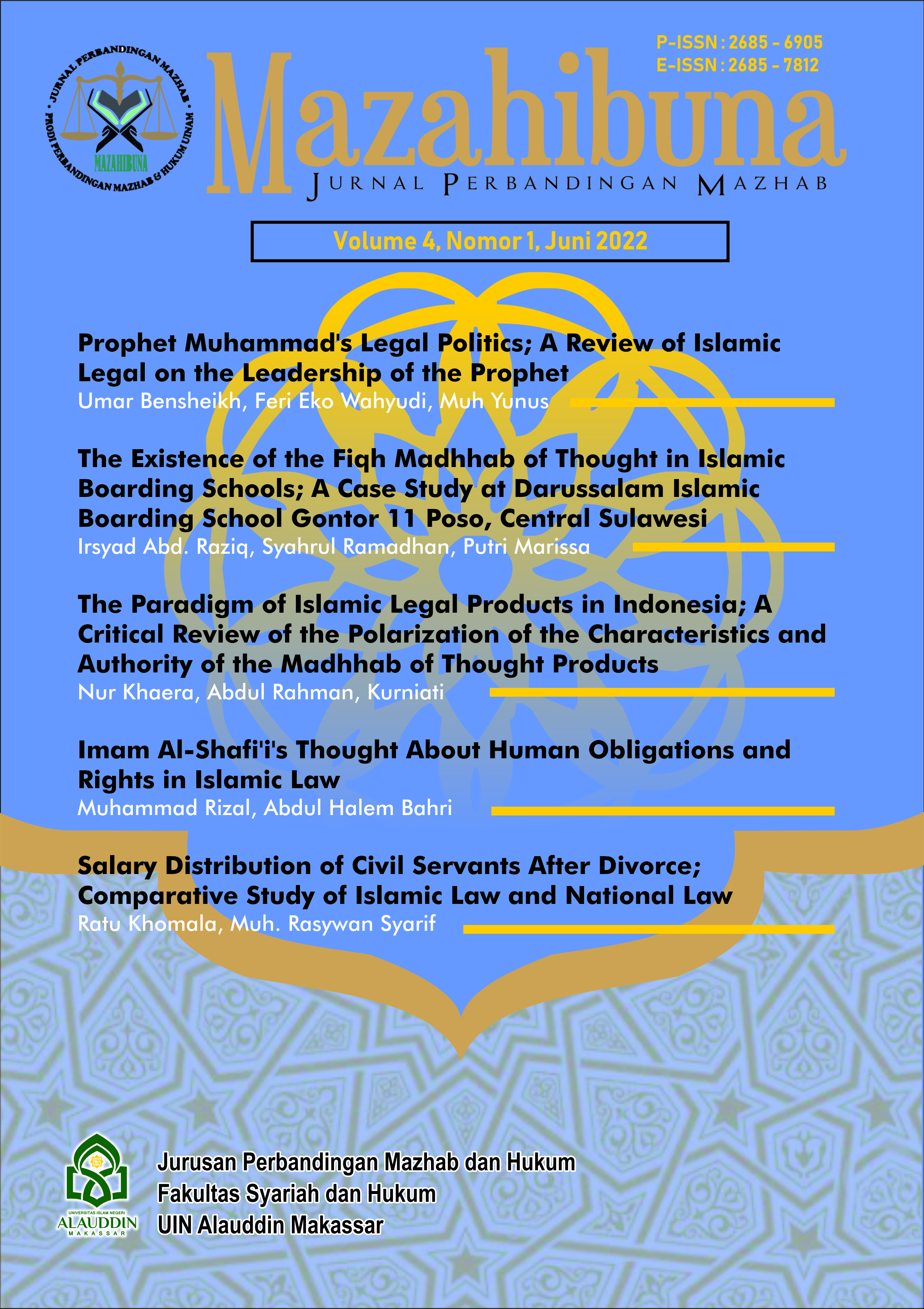The Paradigm of Islamic Legal Products in Indonesia
A Critical Review of the Polarization of the Characteristics and Authority of the Madhhab of Thought Products
Abstract
Islamic law grows in Indonesia and is formulated in four legal thought products, namely fiqh, jurisprudence, law, and fatwa. The problematic Application of Legal Products is more related to the internal aspects of Muslims, who are less dynamic and pay less attention to the developing problem. Therefore, a huge difference occurs between static Islamic and dynamic western legal products using a normative approach. The results showed that Islamic legal products resulted from the work of ijtihad, fiqh, and Islamic law experts. Each Islamic legal product has characteristics and particularities, and the application implicitly raises problems. However, Islamic legal products have been applied explicitly as the law regulates. The products have reliable binding power through a fatwa, judges’ decisions, and critical reviews have increased diversity awareness. The results of the fatwa provided many legal answers to the problems, and the establishment of Religious Courts facilitates justice seekers in solving legal issues. The position of legalized Islamic law is strengthened, and a more profound elaboration is needed to analyze the polarization of product authority.
References
Abdurrahman, Zulkarnain. “Teori Maqasid Al-Syatibi Dan Kaitannya Dengan Kebutuhan Dasar Manusia Menurut Abraham Maslow.” Al-Fikr 22, no. 1 (2020): 52–70.
Addiarrahman, Addiarrahman, and Illy Yanti. “Dari Idealisme Ke Pragmatisme: Pergeseran Paradigma Dalam Pengembangan Hukum Ekonomi Syariah Di Indonesia.” Al-Manahij: Jurnal Kajian Hukum Islam 14, no. 2 (2020): 191–210. https://doi.org/10.24090/mnh.v14i2.3408.
Alwy, Fauna. “Reformulation of the Government Compilation of Islamic Law: Strengthening the Concept of Gender-Sensitive Regulations in Indonesia.” FIAT JUSTISIA:Jurnal Ilmu Hukum 11, no. 4 (2018): 355. https://doi.org/10.25041/fiatjustisia.v11no4.983.
Muammar Bakry, Abdul Syatar, Achmad Abubakar, Chaerul Risal, Ahmad Ahmad, and Muhammad Majdy Amiruddin. “Strengthening the Cyber Terrorism Law Enforcement in Indonesia: Assimilation from Islamic Jurisdiction.” International Journal of Criminology and Sociology 10 (2021): 1267–76. https://doi.org/10.6000/1929-4409.2021.10.146.
Fariana, Andi. “Legal Politics as a Catalyst in Forming Sharia Economic Legal System in the Indonesia’s New Order and Reform Era.” Ijtihad : Jurnal Wacana Hukum Islam Dan Kemanusiaan 21, no. 2 (2021): 197–212. https://doi.org/10.18326/ijtihad.v21i2.197-212.
Fatmawati, Dinar. “Islam and Local Wisdom in Indonesia.” Journal of Sosial Science 2, no. 1 (2021): 20–28. https://doi.org/10.46799/jsss.v2i1.82.
Hamad, Ahmed M.A., Haslinda binti Mohd Anuar, and Rohizan binti Halim. “The Judiciary in Islamic Law, Palestinian Legislation, and Guarantees of Its Independence.” Samarah 5, no. 1 (2021): 1–22. https://doi.org/10.22373/sjhk.v5i1.8927.
Hermanto, Agus. “Eksistensi Konsep Maslahat Terhadap Paradigma Fikih Feminis Muslim Tentang Hak Dan Kewajiban Suami Isteri.” Nizham 7, no. 2 (2019): 263.
Kementerian Agama RI. Al-Qur’an Dan Terjemahannya. Jakarta: Lajnah Pentashihan Mushaf Al-Qur’an Badan Litbang dan Diklat Kementerian Agama RI, 2019. https://lajnah.kemenag.go.id/unduhan/category/3-terjemah-al-qur-an-tahun-2019.
Khalfaoui, Mouez. “Work between Obligation and Right in Muslim Culture : Is There a Paradigm Shift?” Journal of Islamic Ethics 5 (2021): 1–22. https://doi.org/10.1163/24685542-12340064.
Kushidayati, Lina. “The Development of Islamic Law in Indonesia.” Qudus International Journal of Islamic Studies 1, no. 2 (2014): 163–80. https://doi.org/10.21043/QIJIS.V1I2.185.
Mahjuddin. Masailul Fiqhiyah Berbagai Kasus Yang Dihadapi Hukum Islam Masa Kini. Jakarta: Kalam Mulia, 2005.
Munir, Sirajul. “Asas Keterbukaan Dalam Pelaksanaan Fungsi Legislasi Dewan Perwakilan Rakyat (Perspektif Islam Dan Hukum Positif Di Indonesia).” YUDISIA : Jurnal Pemikiran Hukum Dan Hukum Islam 12, no. 2 (2021): 257. https://doi.org/10.21043/yudisia.v12i2.12260.
Najib, Agus Moh. “REESTABLISHING INDONESIAN MADHHAB ‘Urf and the Contribution of Intellectualism.” Al-Jāmi‘ah: Journal of Islamic Studies 58, no. 1 (2020): 171–208. https://doi.org/10.14421/ajis.2020.581.171-208.
Nurjaman, Muhamad Izazi, and Doli Witro. “The Relevance of the Theory of Legal Change According to Ibnu Qayyim Al-Jauziyyah in Legal Products by Fatwa DSN-MUI Indonesia.” El-Mashlahah 11, no. 2 (2021): 164–86. https://doi.org/10.23971/elma.v11i2.3181.
Purkon, Arip. “Political Parties and Islamic Law Positivization in Contemporary Indonesian Governance.” Humanities & Social Sciences Reviews 9, no. 2 (2021): 75–86. https://doi.org/10.18510/hssr.2021.928.
Rohmah, Siti, Ilham Tohari, and Moh. Anas Kholish. “Menakar Urgensi Dan Masa Depan Legislasi Fiqih Produk Halal Di Indonesia.” Al-Manahij: Jurnal Kajian Hukum Islam 14, no. 2 (2020): 177–90. https://doi.org/10.24090/mnh.v14i2.3811.
Rokhmad, Abu, and Sulistiyono Susilo. “Conceptualizing Authority of the Legalization of Indonesian Women’s Rights in Islamic Family Law.” Journal of Indonesian Islam 11, no. 2 (2017): 489–508. https://doi.org/10.15642/JIIS.2017.11.2.489-508.
Saifuddin, Saifuddin. “Prospek Hukum Islam Dalam Sistem Hukum Indonesia.” Al-’Adalah 14, no. 2 (2018): 461. https://doi.org/10.24042/adalah.v14i2.2516.
Supardin, Supardin, and Abdul Syatar. “Adultery Criminalization Spirit in Islamic Criminal Law: Alternatives in Indonesia’s Positive Legal System Reform.” Samarah: Jurnal Hukum Keluarga Dan Hukum Islam 5, no. 2 (2021): 913–27. https://doi.org/http://dx.doi.org/10.22373/sjhk.v5i2.9353.
Supena, Ilyas. “Konstruksi Epistemologi Fikih Pandemik: Analisis Fatwa-Fatwa MUI.” Al-Manahij: Jurnal Kajian Hukum Islam 15, no. 1 (2021): 121–36. https://doi.org/10.24090/mnh.v15i1.4203.
Triasari, Devi, and Francesco De Zwart. “The Legal Reform Policy on the Shariah Supervisory Board Role’s in Indonesian Shariah Banks.” Bestuur 9, no. 2 (2021): 113–25. https://doi.org/10.20961/bestuur.v9i2.55173.
Ulya, Nurul Ula. “Legal Protection of Donation-Based Crowdfunding Zakat on Financial Technology: Digitalization of Zakat under Perspective of Positive Law and Islamic Law.” International Conference of Zakat, 2019. https://doi.org/10.37706/iconz.2018.132.
Yeni Salma Barlinti. “Inheritance Legal System in Indonesia: A Legal Justice for People.” INDONESIA Law Review 1, no. 1 (2013): 23–41.

This work is licensed under a Creative Commons Attribution 4.0 International License.
Authors who publish with Mazahibuna: Jurnal Perbandingan Mazhab agree to the following terms:
- Authors retain copyright and grant the Mazahibuna: Jurnal Perbandingan Mazhab right of first publication with the work simultaneously licensed under Creative Commons Attribution License (CC BY 4.0) that allows others to share the work with an acknowledgment of the work's authorship and initial publication in this journal.
- Authors can enter into separate, additional contractual arrangements for the non-exclusive distribution of the published version of the work (e.g., post it to an institutional repository or edit it in a book), with an acknowledgment of its initial publication in this journal.
- Authors are permitted and encouraged to post their work online (e.g., in institutional repositories or on their website) before and during the submission process, as it can lead to productive exchanges, as well as earlier and greater citation of published work.

